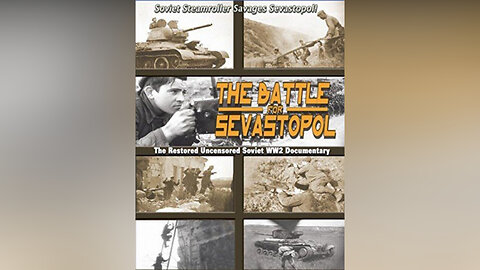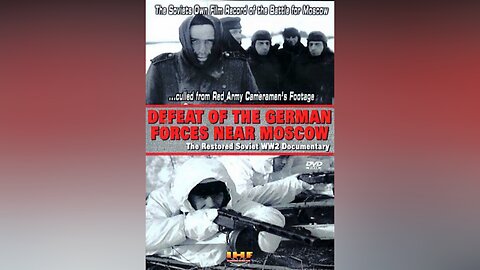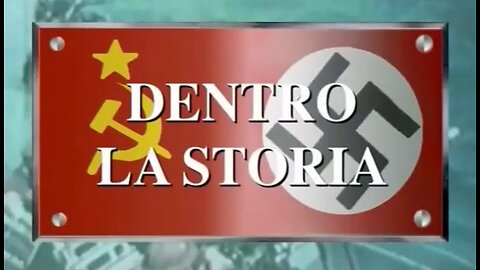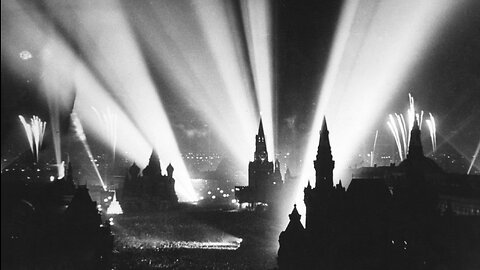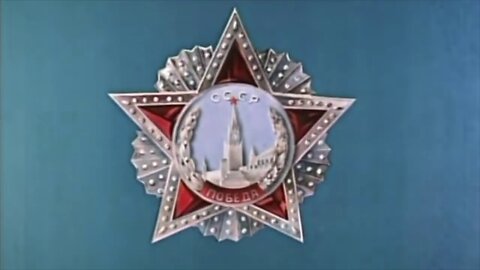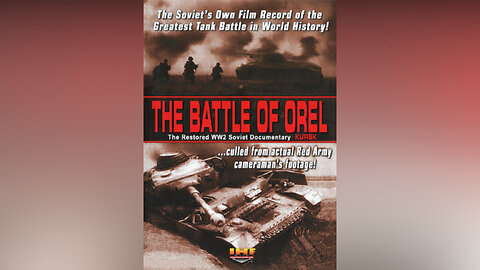
-
The Battle of Orel/Kursk (1943)
 Adaneth - History&PoliticsThe Soviet's Own Film Record of the Greatest Tank Battle in World History. A 1943 USSR Documentary Film, Directed by R. Gikov L. Stepanova. Filmed by cameramen of the Bryansk Front. Audio in English with English subtitles for Russian intertitles. Culled from actual combat footage taken onsite by Red Army cameramen at the Orel/Kursk Salient in Russia in the summer of 1943, this is the Soviets’ own documentary story of the greatest tank battle in world history before or since, pitting the resurgent German Army against the now-victorious Red Army. The Germans introduced their new Tiger and Panther tanks, but were overwhelmed by massed T-34s. For the Germans, it was a must-win battle, and when they lost, the Soviets gained the initiative for the rest of the war. Known in the West as the Battle of Kursk, it was the greatest armored combat in history ever -before or since.98 views
Adaneth - History&PoliticsThe Soviet's Own Film Record of the Greatest Tank Battle in World History. A 1943 USSR Documentary Film, Directed by R. Gikov L. Stepanova. Filmed by cameramen of the Bryansk Front. Audio in English with English subtitles for Russian intertitles. Culled from actual combat footage taken onsite by Red Army cameramen at the Orel/Kursk Salient in Russia in the summer of 1943, this is the Soviets’ own documentary story of the greatest tank battle in world history before or since, pitting the resurgent German Army against the now-victorious Red Army. The Germans introduced their new Tiger and Panther tanks, but were overwhelmed by massed T-34s. For the Germans, it was a must-win battle, and when they lost, the Soviets gained the initiative for the rest of the war. Known in the West as the Battle of Kursk, it was the greatest armored combat in history ever -before or since.98 views -
The Battle for Sevastopol (1944)
 Adaneth - History&PoliticsA 1944 Soviet WW2 Documentary Film, Directed by Vasily Belyaev. Audio in Russian with English subtitles. Produced right after the Red Army threw out the Germans in 1944, this stunning epic of gritty combat action is a most gripping battle documentary. Drawing upon footage from 19 Soviet cameramen - and made under the guidance of Soviet director Vasily Belyaev - they capture the tumultuous Eastern Front in many different angles and views, bringing vividly to life the mighty struggle of war between Nazi and Red Armies.186 views
Adaneth - History&PoliticsA 1944 Soviet WW2 Documentary Film, Directed by Vasily Belyaev. Audio in Russian with English subtitles. Produced right after the Red Army threw out the Germans in 1944, this stunning epic of gritty combat action is a most gripping battle documentary. Drawing upon footage from 19 Soviet cameramen - and made under the guidance of Soviet director Vasily Belyaev - they capture the tumultuous Eastern Front in many different angles and views, bringing vividly to life the mighty struggle of war between Nazi and Red Armies.186 views -
Moscow Strikes Back/Defeat Of The German Forces Near Moscow (1942)
 Adaneth - History&PoliticsDefeat of the German Forces Near Moscow (also known as Moscow Strikes Back) is a 1942 USSR Documentary Film of the Battle for Moscow, directed by Leonid Varlamov and Ilya Kopalin. Audio in Russian with English subtitles. Soviet wartime cameramen accompanied the fighting troops of the Red Army on foot, aboard their tanks, and in their aircraft to film this epochal documentary of the Battle of Moscow that halted the vaunted and-until then, unstoppable-German war machine cold in its tracks. It is a stunning record of the Soviet capital’s epic civilian defense, as well as the major battle that included ski troops and airborne paratroop forces, plus the liberation of Russian villages. In what became the most widely shown Allied film documentary of the war, it was released to great acclaim in the USSR on Feb. 23, 1942, just a month after the actual battle ended! The film had a terrific propaganda effect at home and worldwide. Released in the United States as Moscow Strikes Back, it won an Academy Award for Best Documentary in 1942, having previously won Russia’s own Stalin Prize. Narrated in English by actor Edward G. Robinson, the film became a powerful weapon in the Allied alliance that began the day after the Moscow battle, when the Japanese bombed Pearl Harbor. This version includes the original Russian soundtrack with English subtitles. It is the full, complete, uncut, and uncensored film, including the harsher dialogue focused on German barbarity. Thus, this is the full Soviet version - not the 1942 US-edited release (known as Moscow Strikes Back) which is almost 10 minutes shorter.115 views
Adaneth - History&PoliticsDefeat of the German Forces Near Moscow (also known as Moscow Strikes Back) is a 1942 USSR Documentary Film of the Battle for Moscow, directed by Leonid Varlamov and Ilya Kopalin. Audio in Russian with English subtitles. Soviet wartime cameramen accompanied the fighting troops of the Red Army on foot, aboard their tanks, and in their aircraft to film this epochal documentary of the Battle of Moscow that halted the vaunted and-until then, unstoppable-German war machine cold in its tracks. It is a stunning record of the Soviet capital’s epic civilian defense, as well as the major battle that included ski troops and airborne paratroop forces, plus the liberation of Russian villages. In what became the most widely shown Allied film documentary of the war, it was released to great acclaim in the USSR on Feb. 23, 1942, just a month after the actual battle ended! The film had a terrific propaganda effect at home and worldwide. Released in the United States as Moscow Strikes Back, it won an Academy Award for Best Documentary in 1942, having previously won Russia’s own Stalin Prize. Narrated in English by actor Edward G. Robinson, the film became a powerful weapon in the Allied alliance that began the day after the Moscow battle, when the Japanese bombed Pearl Harbor. This version includes the original Russian soundtrack with English subtitles. It is the full, complete, uncut, and uncensored film, including the harsher dialogue focused on German barbarity. Thus, this is the full Soviet version - not the 1942 US-edited release (known as Moscow Strikes Back) which is almost 10 minutes shorter.115 views -
Victory Parade on Red Square - June 24, 1945 (Full Version)
 Adaneth - History&PoliticsAudio in Russian with no English subtitles. At 1:10 a.m. on May 9, 1945, night owls in the USSR heard a radio report that Nazi Germany had officially surrendered to the Soviet Union. Up to 30 million soldiers and civilians were dead, the Soviet Union had lost a third of its national wealth, cities such as Stalingrad had been reduced to lunar landscapes, and an entire generation of men had been decimated. Searchlights illuminated a city that a few years earlier had almost fallen to the Germans, cannon-fire and fireworks exploded over the Kremlin and relieved citizens crowded into Red Square to share their enormous collective relief. The large crowd on Red Square danced, kissed, sang and chatted excitedly. It would not be until 24 June 1945, that the USSR held a proper victory parade, in torrential rain. On that day, one by one, soldiers lined up to toss the defeated German army’s banners and standards, including Hitler’s own personal standard, into a sodden mess at Stalin’s feet beneath Lenin’s tomb. Victory Day over Nazi Germany is celebrated every year on May 9th in Russia and other former USSR countries to preserve the memory of unbearable suffering and great courage of the Soviet people.186 views
Adaneth - History&PoliticsAudio in Russian with no English subtitles. At 1:10 a.m. on May 9, 1945, night owls in the USSR heard a radio report that Nazi Germany had officially surrendered to the Soviet Union. Up to 30 million soldiers and civilians were dead, the Soviet Union had lost a third of its national wealth, cities such as Stalingrad had been reduced to lunar landscapes, and an entire generation of men had been decimated. Searchlights illuminated a city that a few years earlier had almost fallen to the Germans, cannon-fire and fireworks exploded over the Kremlin and relieved citizens crowded into Red Square to share their enormous collective relief. The large crowd on Red Square danced, kissed, sang and chatted excitedly. It would not be until 24 June 1945, that the USSR held a proper victory parade, in torrential rain. On that day, one by one, soldiers lined up to toss the defeated German army’s banners and standards, including Hitler’s own personal standard, into a sodden mess at Stalin’s feet beneath Lenin’s tomb. Victory Day over Nazi Germany is celebrated every year on May 9th in Russia and other former USSR countries to preserve the memory of unbearable suffering and great courage of the Soviet people.186 views
